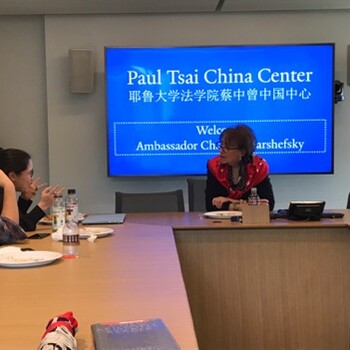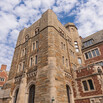Ambassador Charlene Barshefsky Visits to Discuss U.S.-China Trade Tensions
On September 26-27, 2018, Ambassador Charlene Barshefsky, a Non-Resident Senior Fellow of the Paul Tsai China Center, visited the China Center to give a lecture and meet with Yale Law School students to discuss current issues related to U.S.-China trade and also to discuss professional opportunities for lawyers in the field of international trade and investment.

Ambassador Barshefsky, who served as United States Trade Representative in President Bill Clinton’s administration, was the key architect and negotiator of China’s WTO accession agreement. It was China’s accession to the World Trade Organization in 2001 that opened up its economy as a worldwide market and fundamentally reshaped global trade. Now chair of the International Trade, Investment and Market Access Practice Group at WilmerHale in Washington, DC, Ambassador Barshefsky is one of the United States’ most respected practitioners of international trade law and thinkers about its future.

Ambassador Barshefsky recounted her experience negotiating China’s WTO accession with her Chinese counterparts in the 1990s, characterizing their efforts as “earnest” and citing statistics to show that China was by no means a closed economy. She noted that the implementation of WTO rules led to real economic reform in China, and the country was on track to become fully compatible with international norms.
Beginning in the latter half of the 2000s and intensifying under President Xi, the Chinese leadership shifted away from market-oriented reforms and instead began consolidating power and expanding government and Communist Party control in businesses, particularly those in strategic sectors. The recent emphasis on state and party guidance contrasts starkly with the early 2000s, when then-Prime Minister Zhu Rongji slashed state-owned enterprises. What remains of “reform and opening,” Ambassador Barshefsky argued, is mostly just “reform” of the economic levers of control.

When it comes to U.S. trade policy towards China, the Ambassador said past presidents have pursued promising strategies — most notably, the Trans-Pacific Partnership — but the United States missed a major opportunity by erring in the roll-out of TPP. The TPP was designed to update WTO rules, which are remarkably outdated because the last round of negotiations took place in 1994, for which the agenda was set in 1984. By not even giving China observer status in the TPP, however, the U.S. left the impression that China was intentionally excluded.
Aside from TPP, Ambassador Barshefsky also emphasized that the United States should have used existing WTO rules more effectively to ensure China’s compliance. Had the relevant WTO provisions on technology transfers and market disruption been used more often by past U.S. administrations through WTO litigation, China’s noncompliant behavior might have been checked, she said.
In closing, Ambassador Barshefsky called on the United States to support multilateral institutions and to seek to retain China’s participation. “The more the U.S. denigrates these institutions, the freer China is to go on a divergent path,” the Ambassador said.
During her visit to the Paul Tsai China Center, Ambassador Barshefsky also met with the Center’s faculty and fellows, and with numerous Yale Law School students — both individually and with student groups such as the National Security Group and the “Law and U.S.-China Trade Conflict” reading group — sharing her invaluable expertise in trade policy and career advice with aspiring students interested in U.S.-China relations.


